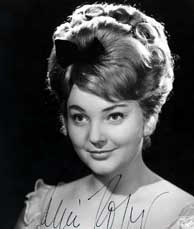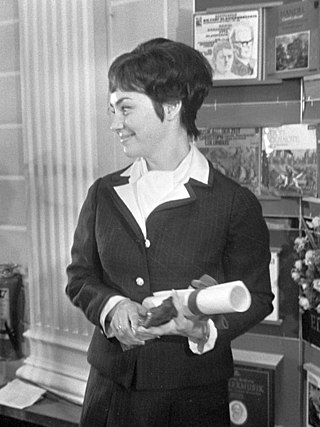
Otto Nossan Klemperer was a German conductor and composer, originally based in Germany, and then the United States, Hungary and finally, Great Britain. He began his career as an opera conductor, but he was later better known as a conductor of symphonic music.

Christa Ludwig was a German mezzo-soprano and sometime dramatic soprano, distinguished for her performances of opera, lieder, oratorio, and other major religious works like masses, passions, and solos in symphonic literature. Her performing career spanned almost half a century, from the late 1940s until the early 1990s.

Werner Klemperer was an American actor. He was known for playing Colonel Wilhelm Klink on the CBS television sitcom Hogan's Heroes, for which he twice won the award for Outstanding Supporting Actor in a Comedy Series at the Primetime Emmy Awards in 1968 and 1969.

Dame Olga Maria Elisabeth Friederike Schwarzkopf, was a German-born Austro-British lyric soprano. She was among the foremost singers of lieder, and is renowned for her performances of Viennese operetta, as well as the operas of Mozart, Wagner and Richard Strauss. After retiring from the stage, she was a voice teacher internationally. She is considered one of the greatest sopranos of the 20th century.

Walter Berry was an Austrian lyric bass-baritone who enjoyed a prominent career in opera. He has been cited as one of several exemplary operatic bass-baritones of his era.

Helen Jeanette Donath is an American soprano with a career spanning fifty years.
Elisabeth Grümmer was a German soprano. She has been described as "a singer blessed with elegant musicality, warm-hearted sincerity, and a voice of exceptional beauty".
Gundula Janowitz is an Austrian lyric soprano singer of operas, oratorios, lieder, and concerts. She is one of the most renowned opera singers of the 20th century and was pre-eminent in the 1960s and 1970s.

Lucia Popp was a Slovak operatic soprano. She began her career as a soubrette, and later moved into the light-lyric and lyric coloratura soprano repertoire and then the lighter Richard Strauss and Wagner operas. Her career included performances at Vienna State Opera, the Metropolitan Opera, Covent Garden, and La Scala. Popp was also a highly regarded recitalist and lieder singer.

Dame Margaret Berenice Price was a Welsh soprano.

Edith Mathis is a Swiss soprano and a leading exponent of the works of Wolfgang Amadeus Mozart worldwide. She is known for parts in Mozart operas, but also took part in premieres of operas such as Henze's Der junge Lord.
Hanna Schwarz is a German mezzo-soprano and contralto singer in opera and concert. In 1976 she performed the roles of Fricka and Erda in the centenary Jahrhundertring production at the Bayreuth Festival, directed by Patrice Chéreau.
Carmen Reppel is a German soprano active in both opera and concert. A member of the Staatstheater Hannover, she had a major international career, appearing in leading roles in over 60 operas. She also explored lesser-known repertoire such as Siegfried Wagner's Schwarzschwanenreich and appeared in contemporary operas, singing in world premieres of operas by Aribert Reimann and Flavio Testi. She is known for her parts in the Jahrhundertring, the centenary production of Wagner's Der Ring des Nibelungen at the Bayreuth Festival, including the filmed version of 1980.
Ilse Gramatzki is a German operatic mezzo-soprano and contralto who performed at major European opera houses. A member of both the Cologne Opera and the Oper Frankfurt she is known for performing roles by Mozart, contemporary opera and roles by Wagner at the Bayreuth Festival including the Jahrhundertring.
Astrid Schirmer is a German operatic soprano and an academic teacher. She sang mostly dramatic roles at major German opera houses and appeared at the Bayreuth Festival.

Camilla Nylund is a Finnish operatic soprano. She appears internationally in lyric-dramatic roles such as Beethoven's Leonore, Verdi's Elisabetta, and Wagner's Elisabeth and Sieglinde. She is especially known for portraying leading female characters in operas by Richard Strauss,. She has appeared at international festivals and the openings of the Dresdner Frauenkirche and the Elbphilharmonie.

Leonore Kirschstein was a German soprano in opera and concert.
Colette Lorand was a Swiss operatic soprano who made an international career. Known as a coloratura soprano, she created several roles in world premieres, including Sibylle in Carl Orff's De temporum fine comoedia in 1973 at the Salzburg Festival, and Regan in Aribert Reimann's Lear at the Nationaltheater München in 1978, also in the French premiere of this opera in Paris in 1982.

Ruth-Margret Pütz was a German operatic coloratura soprano and an academic voice teacher. She was a member of the Staatsoper Stuttgart for many decades, a frequent guest at the Vienna State Opera, and appeared at other major international opera houses and festivals. One of her signature roles was Konstanze in Mozart's Die Entführung aus dem Serail. She is regarded as one of the leading coloratura sopranos of the 1960s.

Johanna André was a German soprano in opera and concert and a voice teacher. A long-term member of the Braunschweig Court Theatre, she appeared at major German opera houses, especially in dramatic roles such as Beethoven's Fidelio, and Wagner's Senta, Isolde and Brünnhilde. She took part in the world premiere of Wagner's Parsifal at the Bayreuth Festival.














